The Windows RT Review
by Vivek Gowri & Anand Lal Shimpi on October 25, 2012 12:00 PM EST- Posted in
- Windows RT
- Operating Systems
- Microsoft
- Mobile
- Windows 8
- Tablets
First Party Applications
Microsoft has bundled in a healthy suite of first party applications for Modern UI, including obvious suspects like Internet Explorer, Mail, Calendar, People, Maps, Messaging, and Bing, as well as apps for things like news, finance, sports, weather, remote desktop, and media playback, amongst others.
There’s also a list of desktop applications that’s a little less heartening. The familiar old Windows Accessories are still sticking around, with favorites like Paint and Notepad joined here by the classic Remote Desktop Connection application, Snipping Tool (another holdover from the Windows Tablet PC days), the Math Input Panel, and XPS document viewer. Ease of access applications, too, are desktop-based, as are system functions like Control Panel, Command Prompt, File Explorer, Task Manager, and the Run dialog. Personally, I’m disappointed that there wasn’t a Modern UI version of Command Prompt because, let’s face it, how cool would that be?
You’ll note that I left out the headlining Windows RT application: Office 2013. It’s one of the most vital pieces to the Windows RT puzzle, so it demands a bit more context - I’ll get to it in a bit, after running through some of the more notable first party applications.
The mail application here is decent, with an ultra-spartan design and a straightforward 3-column layout. You get accounts and folders on the far right, a middle column with the sender, subject, and thread information. When you expand a multi-email thread, a message preview is also shown. Finally, in the main part of the window, the selected message is displayed. If you’ve used any recent version of Outlook or Hotmail, the layout and implementation should be instantly familiar except for the Metro visual style. Compose, reply, and delete are located in the top right corner of the email window, while mark as unread and move to folder are located in the bottom edge swipe bar.
As far as options go, there really isn't much to mess with - just the ability to turn off threaded messaging. You can connect any EAS, IMAP, or POP email accounts, with support for Hotmail, Gmail, Exchange, AOL, and Yahoo mail accounts built in already. For Gmail accounts, the delete button actually just archives things - to really delete mails, you need to move the message to the deleted folder.
Mail isn't Outlook, and usability is far from perfect. Manual syncing requires an edge gesture to reveal the sync button and there's no way to just tap on a sender's name and create a new email. There are other little issues like these that keep Mail from being a best in class tablet email client. Mail works, it just isn't great.
Calendar
The calendar application is similarly focused - a very clean user interface with not too much power, but it does exactly what it needs to. It will sync to Hotmail, Google, and Outlook calendars, and I'm hoping that once there is a Facebook application, it will sync to that as well. You can pick between day, week, and monthly resolution from the bottom swipe menu, which is also where you add new calendar events. Options for adding new calendar events include date, time, length, location, repetition and reminders - the standard list. The UI is again very touch-centric, so trying to use the calendar with just the mouse is slightly frustrating since everything is hidden in the edge swipe bar. Thankfully, pressing or clicking on a particular day/time takes you directly to a new event creation page, which is pretty convenient. I like the way the calendar application operates, and the visual style is perfect for getting the information you need at a glance. Power users might find it lacking, but for basic tasks, it's more than adequate.
Messaging
The messaging application is one that has so much potential, but needs more to really be useful unless you only use Live Messenger and Facebook Chat. Personally, given the Skype acquisition and the combining of the Windows and Skype IDs (I’ll get to this later, but basically when you login to Skype, your Windows ID is linked to your Skype ID), I feel like the Messaging app should either include Skype chat in it or somehow fuse Skype with the messaging protocols already in place. I personally rely on Google Talk, and in an ideal world it would be supported as well, but I won’t hold my breath.
Nobody I know has used Live Messenger since it stopped being MSN Messenger, so I reserved most of my testing for Facebook Chat. It’s a good looking chat interface, but using it full-screen is a total waste of display real-estate. Messenger is an application that lives for Windows 8 Snap, and it’s really the perfect app to show off that capability with. Finally, a tablet operating system that’s good for instant messaging.
Bing News, Sports, and Travel
There are a variety of Bing-based applications here - News, Sports, Travel, and of course, Bing itself. I personally don’t find too much point to the Bing search app, since if I’m already in the browser it’s much easier just to search from the URL bar.
The other applications are somewhat interesting though. Sports and News are very similarly designed, so I’ll cover them together. Basically, there’s a top story that takes up most of the front page. You can horizontally scroll through a number of other headlines, aggregated from various news sources (Reuters, NYT, AP, etc) and separated by category - US, World, Technology, Business, etc. You can choose to browse the “Bing Daily” news, news specially targeted towards you, or pick from the list of sources to see each one individually. (My feed was full of technology news, wonder why.) Sports is essentially the same thing, except with the categories being sorted into the various sports. You can pick favorite teams, look at all the day’s sporting news or just the particular sport you want to see.
In either case, the articles are presented in a clean, easy to read format. For a one-stop-shop news source, it’s pretty decent. The overall treatment reminds me a bit of Flipboard a bit, while the articles themselves are displayed in a reading optimized context like Apple’s Reader mode in Safari. The treatment is obviously different - horizontal columns and page scrolling, but it’s a generally similar concept.
Bing Travel is a bit different - it has a list of popular destinations, and features numerous photos, maps, panoramas, list of attractions, hotels, restaurants, and guides for each city page. From the app, you can research the location, book flights and hotels, and use the application to guide your trip plan in terms of sites and restaurants to visit. Most big cities in each geographic region are listed, though smaller travel destinations are a bit harder to come by. I can see the app being really useful when on travel as a more convenient alternative to Yelp.


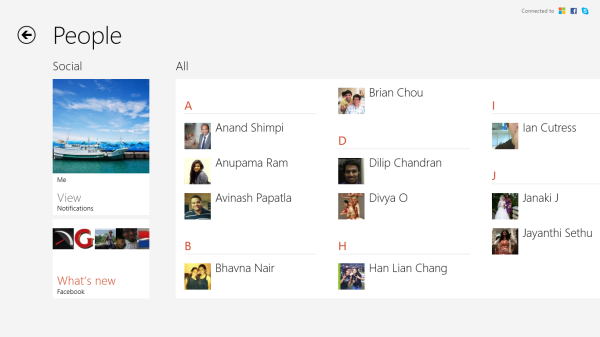
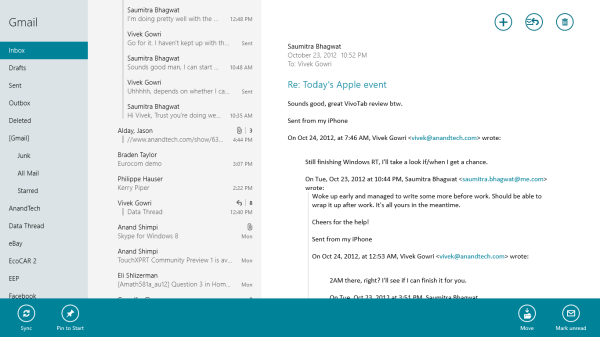
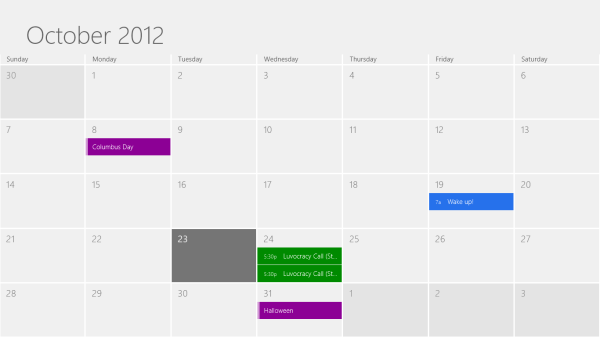
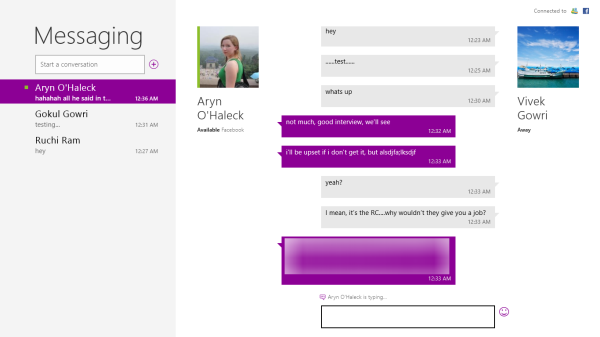
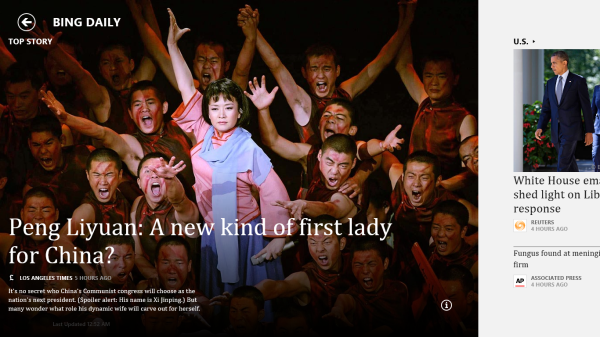
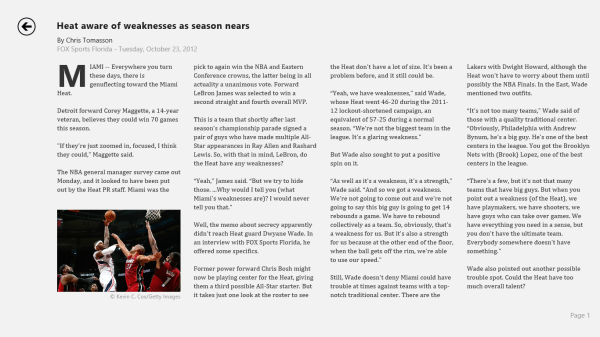
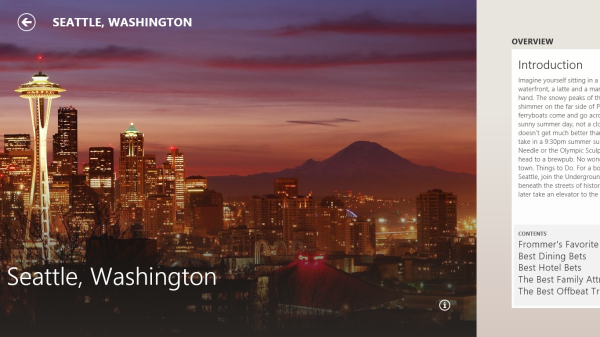








233 Comments
View All Comments
Flemo86 - Saturday, October 27, 2012 - link
With WindowsRT (oh God what an awful name) they're now competing with Apple on Apple's terms, and Apple have had a 5 year head start with iOS. It's just ridiculous that they have .NET, XNA, DirectX etc at such a sweet spot right now, with so many developers on board and able to program whatever the hell they want for the OS (complete with file system!), and then they just change the game entirely by tearing x86 out and putting in what may as well be an Apple chip.They should have come up with a better solution to use ALL existing software and their architectures with every device, not just the "Pro" version. That would've been real competition with the iPad. Imagine being able to port all Xbox live arcade games and every .NET application to the "Windows App Store"/Marketplace (whatever they're calling it). All Microsoft would have to do is verify each piece of software and then bada-bing bada-boom, you've got yourself tens of thousands of apps within the month, and an extremely easy set of tools for devs to use.
Of course, this would've required more effort on the hardware side. Maybe less battery life? A lower screen resolution? More effort on Intel's part? I really hope Windows RT falls by the wayside and Windows 8 Pro tablets become the de facto standard. I hate the idea of them throwing a decade worth of development tools out on one of their operating systems.
Sorry for the rant, just an XNA fan!
stimudent - Saturday, October 27, 2012 - link
Since this system uses Windows and an ARM processor instead of an Intel processor, that makes it 50% respectable. To achieve the other 50%, it would have to have Linux installed.yyrkoon - Sunday, October 28, 2012 - link
Ok, I'll bite.Whats so good about Linux ?
Polish ? Security ? painless upgrade path ? The majority of modern games played on the PC are written for this software platform ?
Or is it that you can feel good about your own self using it for free. Without having to use pirates bay ?
Seriously. Grow up.
Also, please tell me you use Ubuntu. So the rest of us can have a good laugh, and totally disregard what you have to say in the future.
B3an - Sunday, October 28, 2012 - link
That made me laugh, because it's true.foolsgambit11 - Saturday, October 27, 2012 - link
that points out that the autumn of 2000 is just before the turn of the new millenium, not just after....milkod2001 - Sunday, October 28, 2012 - link
@yyrkoonwhat's good about Linux?
lol u gotta be kidding
Android is based on Linux so iOS . That covers all Apple platform and the rest of all smartphones and tablets. Most servers are running on Linux. Not enough?
The majority of modern games played on the PC are written for this software platform ?
The majority of modern games are coded for console kids(Xbox and PS3), then ported to PC.PC games market is only the niche part of games market anyway.
Ubuntu is for geeks/scientisc/developers and not for average uneduceted joes
solipsism - Sunday, October 28, 2012 - link
"Android is based on Linux so [is] iOS."Um... double no.
Android uses the Linux kernel and some underlying code but it is not Linux in the way stimudent is talking about which is why we call it Android and not Linux or Android Linux.
iOS uses Darwin OS and foundations and frameworks found in Mac OS X. "Darwin is built around XNU, a hybrid kernel that combines the Mach 3 microkernel, various elements of BSD (including the process model, network stack, and virtual file system), and an object-oriented device driver API called I/O Kit.[6] The hybrid kernel design compromises between the flexibility of a microkernel and the performance of a monolithic kernel." All this came from NeXTSTEP and BSD before that. There is no Linux in iOS.
yyrkoon - Sunday, October 28, 2012 - link
Yeah notable features at least in my mind is that Android uses ( as standard ) A virtual machine to run each application. Kind of, but not the same as JRE..Big difference from Linux just in that. The architecture is really interesting. Despite the fact that java is the primary development language used for creating apps. Unless you choose to write native C/C++, or use a third party "scripting language". Passed that I'm sure you'd be able to write standard kernel level drivers, but yeah . . .
Mono for android is particularly interesting to me, but a bit pricey.
yyrkoon - Sunday, October 28, 2012 - link
Ubuntu is garbage.Architecturally it can be unstable, it has a very poor upgrade path track record, and they want to put google search on your desktop.
All that despite the fact that is based on one of the better distro's around IMHO. Debian.
yyrkoon - Sunday, October 28, 2012 - link
Oh and yeah to follow up on what was left out of the comments to your post.Most network admins I know that want the least bit of hassle when dealing with servers do not always opt for Linux. Just for the sake of using Linux. These people realize that an operating system is a tool, all of which have their strong and weak points. With OSX being somewhere in the middle. My post above down to the first four lines of text were pure sarcasm. With the fifth and sixth lines being tongue in cheek.
Any operating system is only as good as the user using it. It does not matter what it is. IF the user is a dumbshit, or does not care .The given OS will probably not work optimally (ever). With varying degrees of optimal operation in between, based on how well the user understands his/her operating system.
Also, we're talking computers here, not gaming consoles. With *ALL* PC games being written on some form of a PC. For the PC. Some being Linux dev machines for cross platform development, but most being Windows / visual studio developers. Ask around the game development community sometime, and ask who uses Windows / visual studio versus Linux / eclipse or some other IDE. You'll find out for yourself. This is for a good reason too. Windows / directx being the prevalent software gaming platform. For the PC. Not to mention the fact that porting games to the xbox is fairly trivial now days. Depending on the tool set you use.
"Ubuntu is for geeks/scientisc/developers and not for average uneduceted joes"
Uh yeah . . . I think this "sentence" speaks for its self.